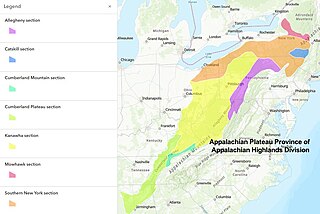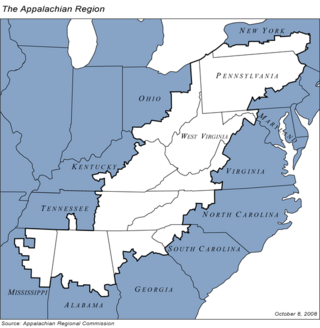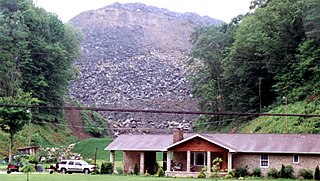Related Research Articles

Appalachia is a geographic region located in the central and southern sections of the Appalachian Mountains of the eastern United States. It stretches from the western Catskill Mountains of New York state into Pennsylvania, continuing on through the Blue Ridge Mountains and Great Smoky Mountains into northern Georgia, Alabama, and Mississippi. In 2021, the region was home to an estimated 26.3 million people, of whom roughly 80% were white.

The Appalachian Plateau is a series of rugged dissected plateaus located on the western side of the Appalachian Mountains. The Appalachian Mountains are a range that run from Nova Scotia in Canada to Alabama in the United States.

Mountaintop removal mining (MTR), also known as mountaintop mining (MTM), is a form of surface mining at the summit or summit ridge of a mountain. Coal seams are extracted from a mountain by removing the land, or overburden, above the seams. This process is considered to be safer compared to underground mining because the coal seams are accessed from above instead of underground. In the United States, this method of coal mining is conducted in the Appalachian Mountains in the eastern United States. Explosives are used to remove up to 400 vertical feet of mountain to expose underlying coal seams. Excess rock and soil is dumped into nearby valleys, in what are called "holler fills" or "valley fills".

Surface mining, including strip mining, open-pit mining and mountaintop removal mining, is a broad category of mining in which soil and rock overlying the mineral deposit are removed, in contrast to underground mining, in which the overlying rock is left in place, and the mineral is removed through shafts or tunnels.
The Buffalo Creek flood was a disaster that occurred in Logan County, West Virginia, on February 26, 1972, when a coal slurry impoundment dam burst, causing significant loss of life and property damage.

Appalachian music is the music of the region of Appalachia in the Eastern United States. Traditional Appalachian music is derived from various influences, including the ballads, hymns and fiddle music of the British Isles, and to a lesser extent the music of Continental Europe.
Erik Reece is an American writer. He is the author of two books of nonfiction - Lost Mountain: A Year in the Vanishing Wilderness: Radical Strip Mining and the Devastation of Appalachia and An American Gospel: On Family, History, and The Kingdom of God, and numerous essays and magazine articles, published in Harper's Magazine, The Nation, and Orion magazine. He also maintains a blog The Future We Want for True/Slant.
Denise Giardina is an American novelist. Her book Storming Heaven was a Discovery Selection of the Book-of-the-Month Club and received the 1987 W. D. Weatherford Award for the best published work about the Appalachian South. The Unquiet Earth received an American Book Award and the Lillian Smith Book Award for fiction. Her 1998 novel Saints and Villains was awarded the Boston Book Review fiction prize and was semifinalist for the International Dublin Literary Award. Giardina is an ordained Episcopal Church deacon, a community activist, and a former candidate for governor of West Virginia.
The Primitive Baptist Universalists are Christian Universalist congregations located primarily in the central Appalachian region of the United States. They are popularly known as "No-Hellers" due to their belief that there is no Hell per se, but that Hell is actually experienced in this life.
Ann Pancake is an American fiction writer and essayist. She has published a novel, short stories and essays describing the people and atmosphere of Appalachia, often from the first-person perspective of those living there. While fictional, her short stories contribute to an understanding of poverty in the 20th century, and well as the historical roots of American and rural poverty. Much of Pancake's writing also focuses on the destruction caused by natural resource extraction, particularly in Appalachia, and the lives of the people affected.
Jeff Biggers is an American Book Award-winning historian, journalist, playwright, and monologist. He is the author and editor of ten books. His most recent book, In Sardinia: An Unexpected Journey in Italy, is a cultural history and travelogue of the island. In the fall of 2024, he will release his first novel, Disturbing the Bones, coauthored with celebrated film director Andrew Davis.

In the United States, the Hillbilly Highway is the out-migration of Appalachians from the Appalachian Highlands region to industrial cities in northern, midwestern, and western states, primarily in the years following World War II in search of better-paying industrial jobs and higher standards of living. Many of these migrants were formerly employed in the coal mining industry, which started to decline in 1940s. The word hillbilly refers to a negative stereotype of people from Appalachia. The term hillbilly is considered to be a modern term because it showed up in the early 1900s. Though the word is Scottish in origin, but doesn't derive from dialect. In Scotland, the term "hill-folk" referred to people who preferred isolation from the greater society and the term "billy" referred to someone being a "companion" or "comrade". The Hillbilly Highway was a parallel to the better-known Great Migration of African-Americans from the south.

Appalachian Voices is an American environmental organization. Their stated environmental concerns include eliminating air pollution, ending mountaintop removal, cleaning up coal ash pollution and promoting renewable energy and energy efficiency.

Julia "Judy" Belle Thompson Bonds was an organizer and activist from the Appalachian Mountains of West Virginia, United States. Raised in a family of coal miners, she worked from an early age at minimum wage jobs. Bonds was the director of Coal River Mountain Watch (CRMW). She has been called "the godmother of the anti-mountaintop removal movement."

Appalachia is a geographic region of the Eastern United States. Home to over 25 million people, the region includes mountainous areas of 13 states: Mississippi, Alabama, Pennsylvania, New York, Georgia, South Carolina, North Carolina, Tennessee, Virginia, Kentucky, Ohio, Maryland, as well as the entirety of West Virginia.
George W. Stroup is J.B. Green Professor Emeritus of Theology at Columbia Theological Seminary. He is a minister in the Presbyterian Church (U.S.A.). He is married to Dr. Donna Fox Stroup, a mathematical statistician.

Environmental justice and coal mining in Appalachia is the study of environmental justice – the interdisciplinary body of social science literature studying theories of the environment and justice; environmental laws, policies, and their implementations and enforcement; development and sustainability; and political ecology – in relation to coal mining in Appalachia.

Environmental issues in Appalachia, a cultural region in the Eastern United States, include long term and ongoing environmental impact from human activity, and specific incidents of environmental harm such as environmental disasters related to mining. A mountainous area with significant coal deposits, many environmental issues in the region are related to coal and gas extraction. Some extraction practices, particularly surface mining, have met significant resistance locally and at times have received international attention.
Helen Matthews Lewis was an American sociologist, historian, and activist who specialized in Appalachia and women's rights. She was noted for developing an interpretation of Appalachia as an internal United States colony, as well as designing the first academic programs for Appalachian studies. She also specialized in Appalachian oral history, collecting and preserving the experiences of Appalachian working-class women in their own words. She is known as the "grandmother of Appalachian Studies" as her work has influenced a generation of scholars who focus on Appalachia.
The city of Baltimore, Maryland includes a significant Appalachian population. The Appalachian community has historically been centered in the neighborhoods of Hampden, Pigtown, Remington, Woodberry, Lower Charles Village, Highlandtown, and Druid Hill Park, as well as the Baltimore inner suburbs of Dundalk, Essex, and Middle River. The culture of Baltimore has been profoundly influenced by Appalachian culture, dialect, folk traditions, and music. People of Appalachian heritage may be of any race or religion. Most Appalachian people in Baltimore are white or African-American, though some are Native American or from other ethnic backgrounds. White Appalachian people in Baltimore are typically descendants of early English, Irish, Scottish, Scotch-Irish, and Welsh settlers. A migration of White Southerners from Appalachia occurred from the 1920s to the 1960s, alongside a large-scale migration of African-Americans from the Deep South and migration of Native Americans from the Southeast such as the Lumbee and the Cherokee. These out-migrations caused the heritage of Baltimore to be deeply influenced by Appalachian and Southern cultures.
References
- 1 2 3 4 5 http://www.creeksidepress.com/biography.html Dick Austin's biography at Creekside Press.
- ↑ Gore, Al. 1992. Earth in the Balance: Forging a New Common Purpose. Earthscan. 1992. ISBN 0-618-05664-5.
- ↑ http://www.creeksidepress.com Creekside Press.
- ↑ Bolgiano, Chris. 2002. Living in the Appalachian Forest. Stackpole Books.
- ↑ Building Utopia: Erecting Russia's First Modern City. Kent State University Press.
- ↑ East of Cleveland. Creekside Press.
- ↑ Dreams and Depression. Creekside Press.
- ↑ The Measure of All Things. Creekside Press
- ↑ Stroup, Russell Cartwright. Letters from the Pacific, A Combat Chaplain in World War II. University of Missouri Press.
- ↑ Stroup, Cranston. Give God a Flower. Creekside Press.